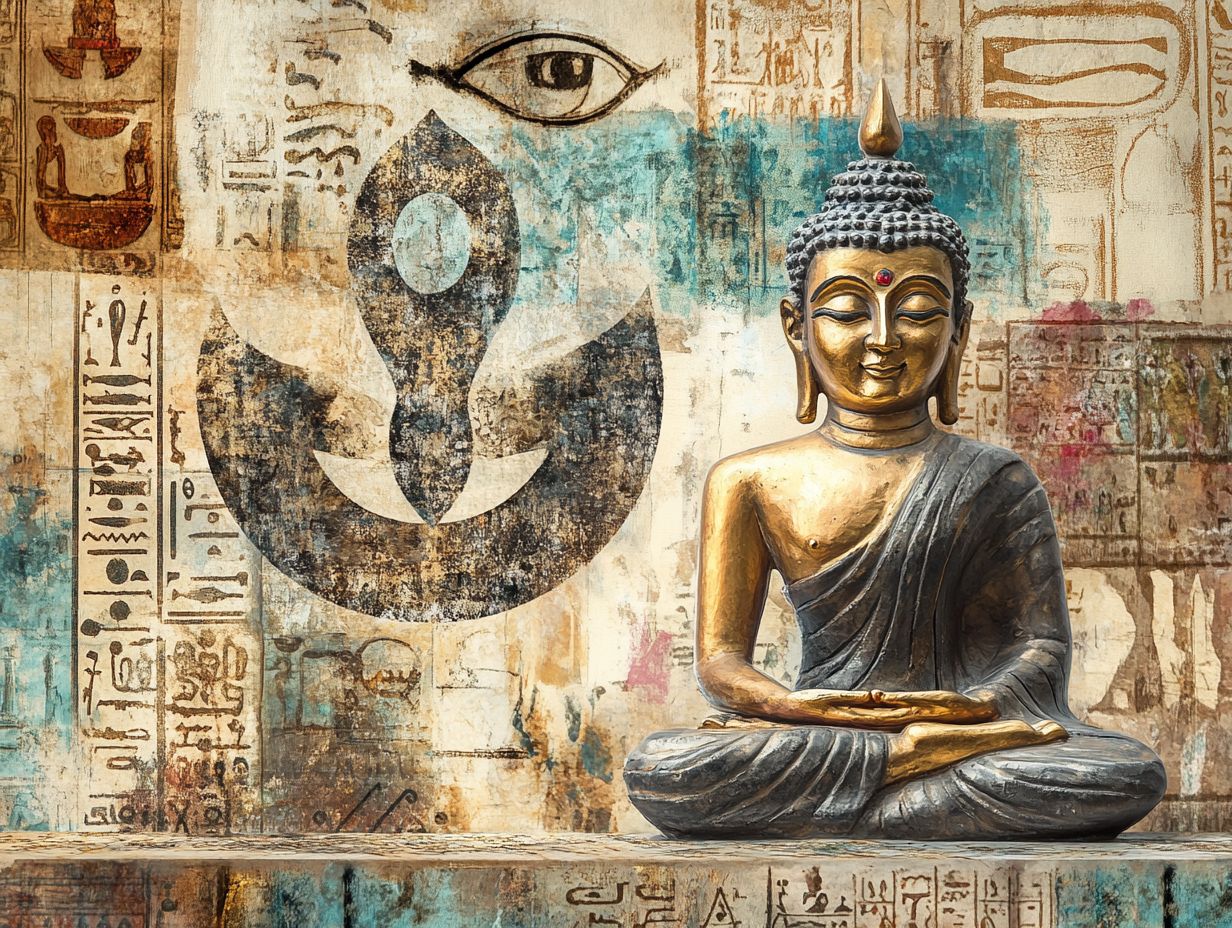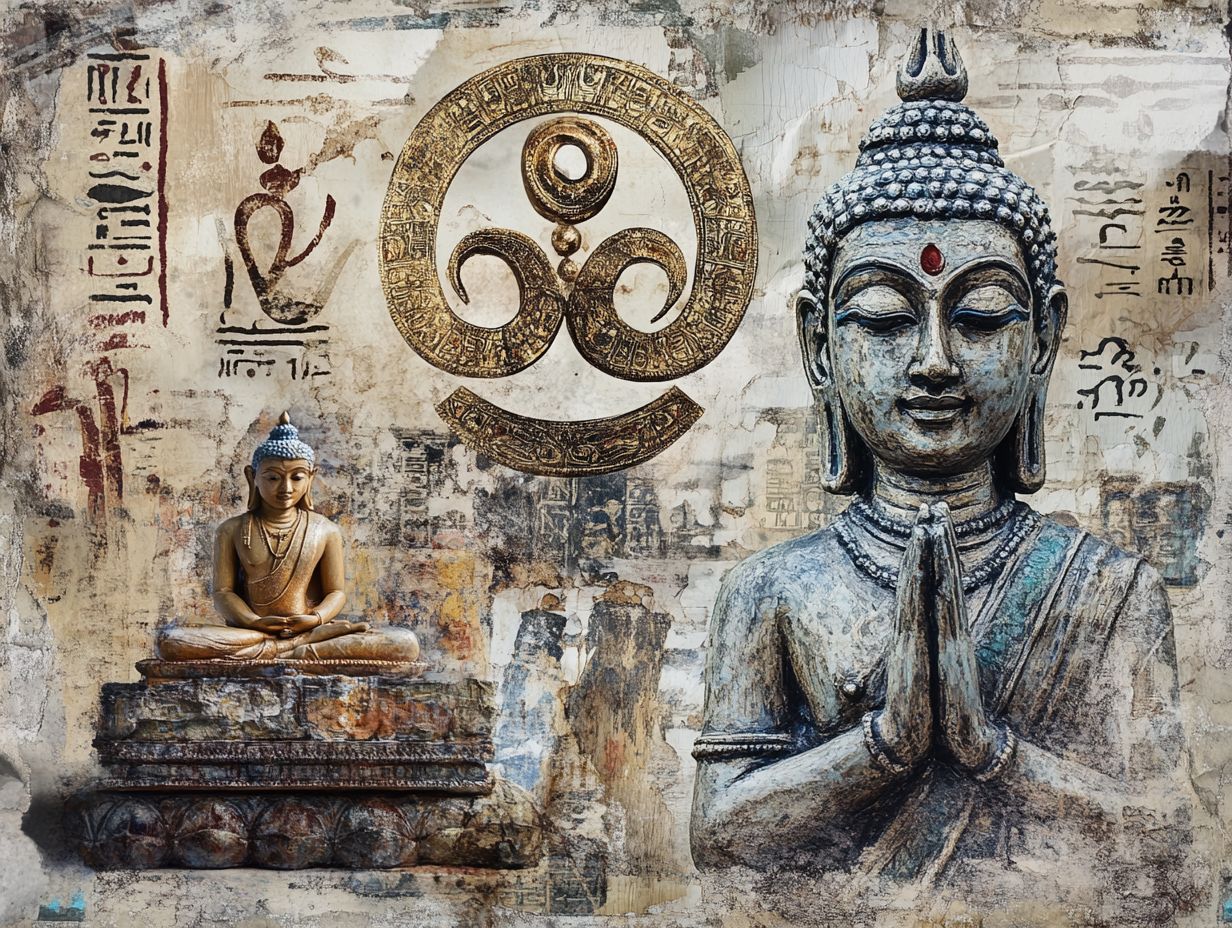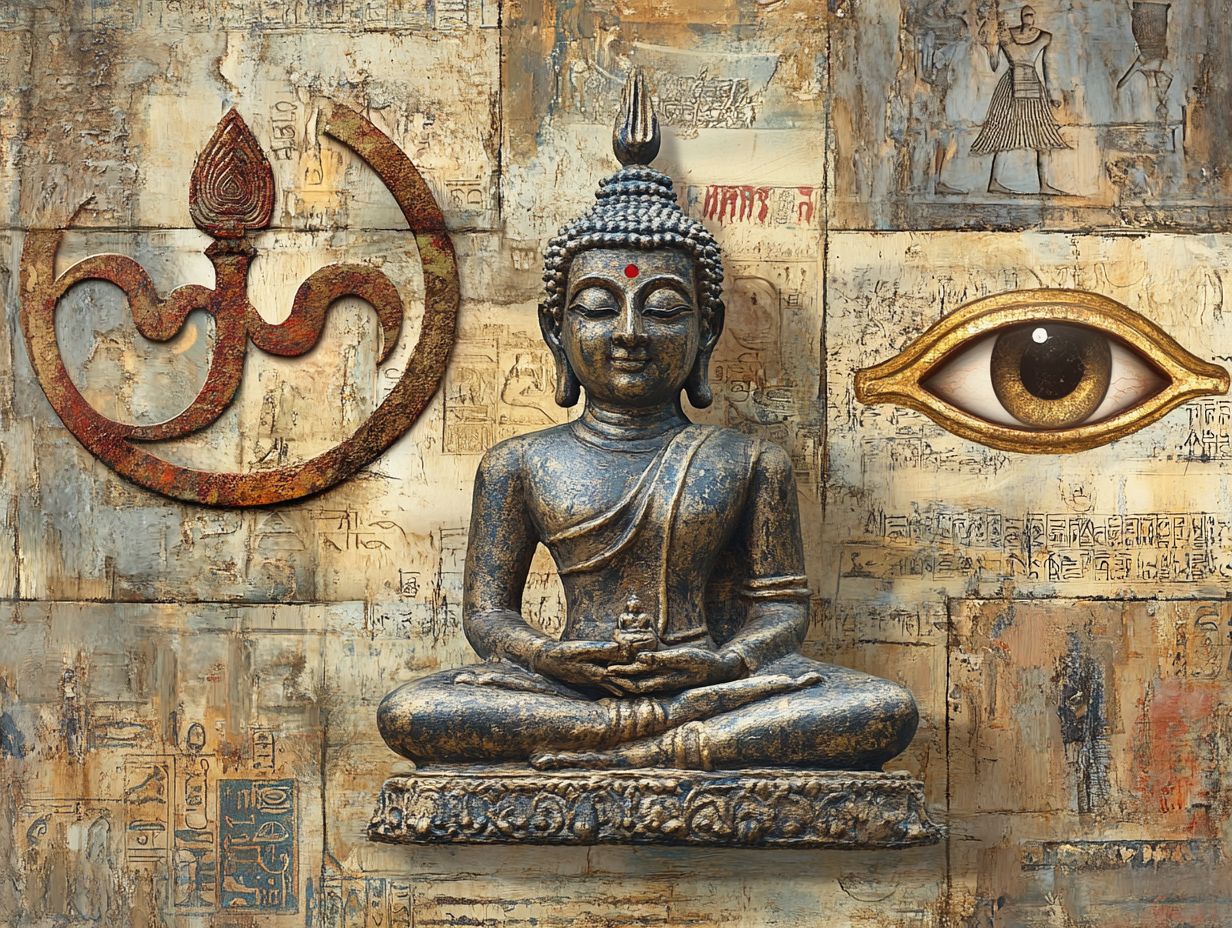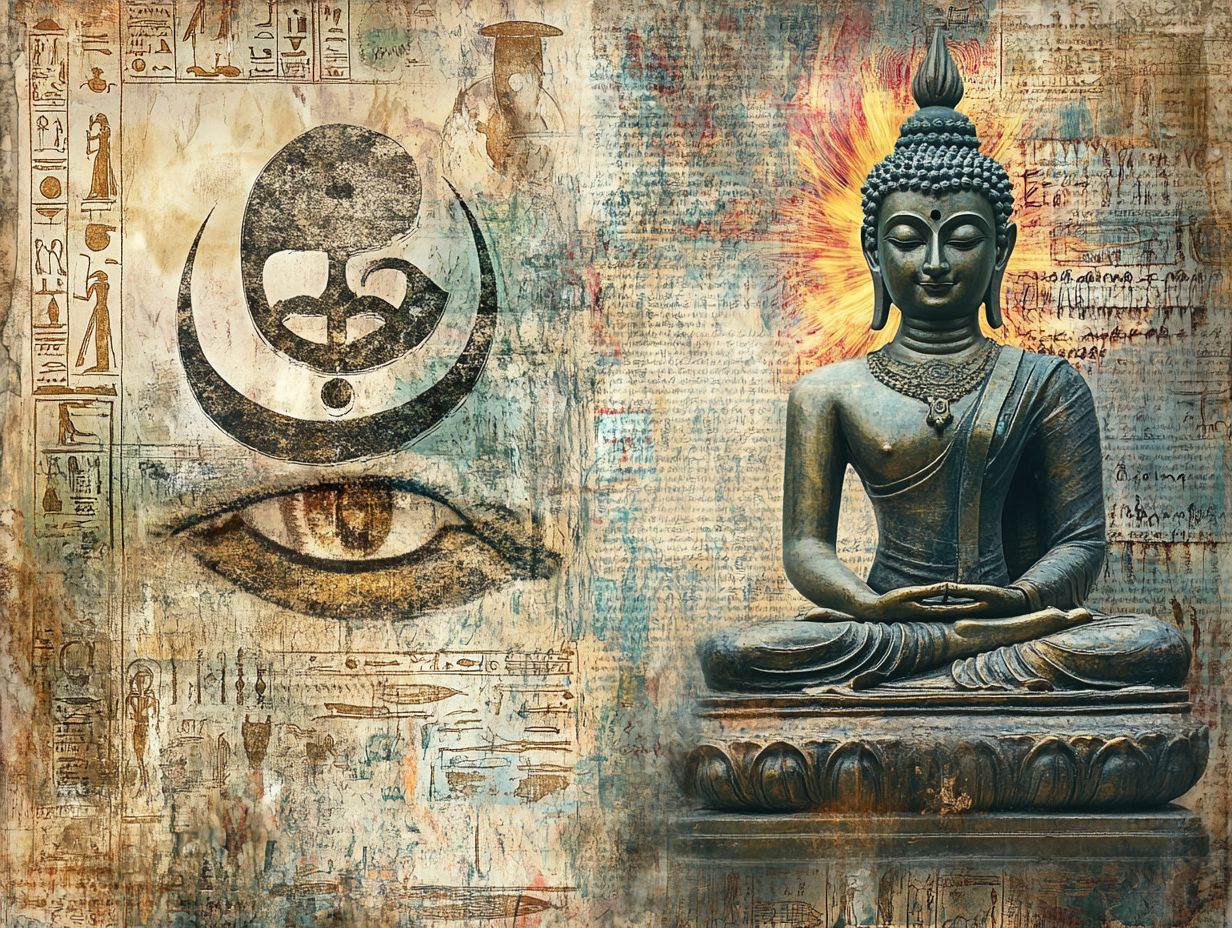Was Hinduism or Buddhism More Similar to Ancient Egyptian Religion?
Exploring the intersections between ancient religions unveils a rich landscape of fascinating parallels and distinctions. This examination delves into the similarities and differences among Hinduism, Buddhism, and Ancient Egyptian Religion, highlighting the rich array of spiritual practices, rituals, and deities that characterize each tradition.
It reveals shared themes such as polytheism, the importance of rituals, and the beliefs in reincarnation and the afterlife, while exploring the religious similarities and differences in their philosophies.
Additionally, it addresses how these faiths diverge in their interpretations of divinity, ethics, and the path to individual enlightenment, considering the roles of asceticism and devotion in their spiritual journeys.
This journey through time offers a profound insight into the intricate tapestry of these spiritual traditions, inviting readers to appreciate the depth and diversity of human belief systems, as well as their historical influence and cultural exchange.
Similarities between Hinduism and Ancient Egyptian Religion

The exploration of similarities between Hinduism and Ancient Egyptian Religion reveals an intricate tapestry of shared beliefs, rituals, and values that transcend both time and geography. Rooted in their respective ancient civilizations, both religions boast a rich pantheon of deities that encapsulates their spiritual narratives and myths. This comparison highlights their cosmology and creation myths, showing the intertwining of mythology and spiritual beliefs.
The worship practices inherent in each tradition highlight the significance of community and the sanctity of various life rituals, where offerings and sacrifices assume a crucial role in appeasing the divine. Furthermore, the ancient scriptures of Hinduism, such as the Vedas, alongside various texts from Ancient Egypt, unveil profound philosophical concepts that have significantly influenced their respective cultures.
1. Polytheistic Beliefs
Both Hinduism and Ancient Egyptian Religion are distinguished by their rich polytheistic beliefs, where a diverse pantheon of deities plays a crucial role in shaping their spiritual practices.
In Hinduism, deities such as Vishnu, the preserver, embody mercy and protection, guiding practitioners through life s myriad challenges while imparting wisdom about duty and righteousness. Similarly, Shiva represents transformation and destruction, encouraging followers to embrace change and let go of what no longer serves their higher purpose.
In contrast, Ancient Egyptian Religion venerates gods like Osiris, the deity of the afterlife, who provides essential guidance on mortality and the moral journey that follows death. Isis, on the other hand, symbolizes motherhood and healing, offering a sense of security and compassion.
The cultural significance of these divine figures is profound. They serve not only as exemplars of moral conduct but also as sources of inspiration for worship, rituals, and community life. This ensures that adherents navigate their existence with a deeper understanding of their roles within the vast cosmos.
2. Importance of Rituals and Offerings
In both Hinduism and Ancient Egyptian Religion, the significance of rituals and offerings is of paramount importance, serving as essential conduits for communication with the divine and fostering engagement within the community. These cultural rituals and ancient rituals are integral to their spiritual practices and ceremonial practices.
These practices encompass a diverse array of daily worship routines, including morning prayers and evening aartis performed in Hindu households, while the ancient Egyptians engaged in regular temple ceremonies to honor their deities. Festivals emerge as vibrant communal platforms for celebration, where symbols such as the Diya lamps during Diwali in Hinduism and the sacred scarab in ancient Egyptian culture cultivate a profound sense of shared identity among devotees.
Sacrificial practices, exemplified by the use of offerings to deities in Hinduism and the tradition of animal sacrifices in ancient Egypt, underscore a deeper intention of seeking blessings and maintaining harmony with the supernatural. Ultimately, both traditions reveal that these rituals serve not only to establish a connection with the divine but also to reinforce communal bonds, thereby strengthening shared beliefs and cultural heritage.
3. Belief in Reincarnation
A significant shared belief between Hinduism and Ancient Egyptian Religion is the concept of reincarnation, wherein the soul’s journey through multiple life cycles is influenced by one’s actions, or karma. This cyclical view of existence fundamentally shapes the moral frameworks that guide adherents in their daily lives.
In Hinduism, there is a pronounced emphasis on dharma, or righteous living, which underscores a commitment to ethical conduct that resonates through successive lifetimes. In a similar vein, the Ancient Egyptians revered Ma’at, the principle of order and justice, which governed both individual behavior and societal norms.
For followers of both traditions, the awareness of reincarnation bestows life with profound purpose; each action is imbued with significance, directly affecting one s destiny in future incarnations. This interconnectedness cultivates a deep respect for life, profoundly influencing how individuals approach spirituality, nurture relationships, and navigate the intricate tapestry of existence.
Similarities between Buddhism and Ancient Egyptian Religion
The parallels between Buddhism and Ancient Egyptian Religion predominantly emerge in their mutual emphasis on morality and ethics. Both traditions share profound beliefs concerning the afterlife and the pursuit of spiritual enlightenment, highlighting a significant intersection in their philosophical frameworks.
1. Emphasis on Morality and Ethics

Both Buddhism and Ancient Egyptian Religion underscore the significance of morality and ethics, providing teachings that guide adherents toward a life of righteousness in alignment with the doctrines of their spiritual leaders.
In Buddhism, the concept of dharma stands as a cornerstone, advocating for a lifestyle rooted in truth, compassion, and non-harming. This ethical framework shapes individual actions and cultivates a sense of community, promoting collective well-being among its followers.
Similarly, in Ancient Egyptian beliefs, a robust moral code was critical for upholding maat, the principle of order and justice. Spiritual leaders in both traditions play essential roles in interpreting these values, inspiring adherents to embody ethical conduct in their everyday lives.
These teachings emphasize the importance of personal integrity and social responsibility, manifesting in rituals, community engagements, and daily interactions that reflect a commitment to moral principles and shared community values, underscoring the role of ethical principles and social responsibility in their spiritual paths.
2. Belief in an Afterlife
Both Buddhism and Ancient Egyptian Religion encompass a profound belief in an afterlife, where the soul embarks on a continued journey, engaging with ancestral spirits and experiencing transcendental phenomena.
In Buddhism, the ultimate aspiration is to attain nirvana, a state that signifies liberation from the relentless cycle of birth and rebirth, known as samsara. This concept underscores an individual’s personal spiritual journey towards enlightenment, emphasizing the cultivation of mindfulness and a detachment from worldly desires.
Conversely, the Ancient Egyptians held mummification in high regard, viewing it as essential to ensure the body remained intact for the soul’s transition to the afterlife. They believed a well-preserved body would serve as a vital support system during the soul’s encounters with gods and spirits while traversing the realm of the dead.
These contrasting beliefs regarding the afterlife profoundly influenced the death rituals and burial practices of both societies, reflecting their distinct interpretations of existence and the beyond, including sacred art and sacred symbols prevalent in their cultures.
3. Importance of Meditation and Enlightenment
Meditation holds a pivotal position in both Buddhism and Ancient Egyptian Religion, acting as a vital pathway to enlightenment and spiritual awakening. Meditation practices highlight their roles in achieving self-awareness and spiritual growth.
In Buddhism, a variety of meditation styles such as mindfulness and loving-kindness steer practitioners toward profound self-awareness and compassion, which are fundamental for reaching Nirvana. Similarly, Ancient Egyptian practices incorporated meditative techniques designed to forge a connection with the divine and comprehend one’s role in the cosmos.
These methods encourage individuals to rise above the ordinary, nurturing a deep yearning for spiritual growth and enlightenment. The mutual emphasis on transcendence in both traditions underscores their universal nature, providing followers with diverse avenues to attain inner peace and a deeper understanding of existence.
Ultimately, these spiritual exercises function not only as instruments for personal development but also as means to foster collective harmony within communities, including communal rituals and sacred chants.
Differences between Hinduism and Ancient Egyptian Religion
Hinduism and Ancient Egyptian Religion, while showcasing notable similarities, also exhibit profound differences, particularly in their concepts of divinity, the roles undertaken by priests, and their foundational beliefs surrounding karma and dharma. These differences underscore the unique religious evolution and historical connections that have shaped each tradition.
1. Concept of God: Polytheism vs. Monotheism
The concept of divinity in Hinduism is fundamentally rooted in monism, where Brahman, the ultimate reality, is expressed through a myriad of deities. In stark contrast, Ancient Egyptian religion adopts a dualistic framework, presenting a well-defined pantheon of gods, such as Osiris and Isis, each with distinct divine roles.
In Hindu belief, the acknowledgment of Brahman as the singular essence from which all existence emanates encourages devotees to perceive the divine in all aspects of life, cultivating a comprehensive view of spirituality and existence. Deities such as Vishnu, Shiva, and other figures mentioned in the Vedas and Upanishads exemplify different dimensions of this all-encompassing reality, embodying the principles of preservation and destruction, respectively.
Conversely, the Ancient Egyptian belief system illustrates dualism through figures like Osiris and Set, who epitomize the interplay of order and chaos within the cosmos. This intrinsic divergence not only illuminates varying perspectives on divine interaction and the essence of existence but also significantly influences the rituals, cultural practices, and philosophical explorations unique to each tradition, including the practice of mummification and the construction of pyramids as sacred structures.
2. Role of Priests and Rituals

The roles of priests in Hinduism and Ancient Egyptian religion exhibit marked differences, with Hindu priests often functioning in a decentralized manner, while their Ancient Egyptian counterparts occupied a more centralized and authoritative position in the execution of state rituals.
This essential distinction profoundly influences how each religion approaches community worship and ritual practices. In Hinduism, priests typically operate at the local temple level, such as in Hindu temples, engaging directly with the community and customizing rituals to address the specific needs of worshippers. Their activities emphasize personal devotion and are deeply rooted in local customs.
In contrast, Ancient Egyptian priests played a crucial role in state functions and rituals that reinforced the pharaoh s divine authority. They conducted elaborate ceremonies closely tied to the nation s sacred geography, encompassing revered sites such as temples and pyramids, often alongside the Nile river, which held significant spiritual importance.
This juxtaposition not only underscores their differing responsibilities but also illustrates how geographic and societal structures shape their religious hierarchies and the significance of their rituals.
3. Belief in Karma and Dharma
A significant distinction between Hinduism and Ancient Egyptian Religion resides in their respective approaches to ethical principles, particularly through the concepts of karma, dharma, and the cycle of samsara in Hinduism, contrasted with the Ancient Egyptians’ emphasis on moral codes devoid of a systematic belief in karma.
Karma, understood as the law of cause and effect, imbues individuals with a profound sense of responsibility, as they recognize that their actions in this life will inevitably influence their future existences. This cycle of reincarnation, also referred to as samsara, is driven not solely by ethical conduct, but also by the deeper pursuit of spiritual liberation, known as moksha.
In stark contrast, Ancient Egyptian Religion operates within a more fixed moral framework dictated by societal laws and judgments, exemplified by the Weighing of the Heart, in which divine entities assess one s deeds. This creates a different understanding of the afterlife, where rewards and punishments are immediate responses rather than outcomes shaped by an ongoing journey of the soul through multiple lifetimes. This practice, carried out by deities like Osiris, reflects the importance of moral codes and divine judgment within their cosmology.
As a result, the interplay of these beliefs not only informs individual behavior but also constructs a fundamentally distinct spiritual landscape for the adherents of each faith.
Differences between Buddhism and Ancient Egyptian Religion
The distinctions between Buddhism and Ancient Egyptian Religion are striking, particularly in the rejection of the caste system inherent in Buddhism, the emphasis on individual enlightenment, and the differing approaches to worship and the divine within their respective spiritual practices.
1. Rejection of Caste System
Buddhism fundamentally rejects the caste system, championing a vision of equality and inclusivity that stands in stark contrast to the rigid social structure typical of Ancient Egyptian Religion. This divergence underscores a significant philosophical rift between the two traditions.
Whereas the caste system, deeply entrenched in Hindu theology, dictated social hierarchies and defined an individual s role in society from birth, Buddhism emerged as a compelling counter-narrative. It advocates for a society where compassion and moral integrity rise above social class distinctions. By emphasizing that every individual holds the potential for enlightenment, irrespective of their social standing, Buddhist teachings cultivate an atmosphere in which equality reigns supreme, which has profound implications for social justice and harmony.
This perspective not only impacts personal relationships but also carries profound implications for social justice and harmony. It inspires a collective movement to dismantle discriminatory practices and foster a more compassionate society.
2. Focus on Individual Enlightenment
Buddhism places a profound emphasis on individual enlightenment, encouraging its followers to engage in spiritual practices that foster self-discovery and personal growth through meditation. This focus on personal development is often realized through a variety of meditation techniques, including mindfulness and loving-kindness meditation, which lead practitioners toward deeper states of awareness and compassion. Such practices are often conducted in Buddhist temples, creating a serene environment for spiritual growth.
Ethical living is essential to this transformative journey, as adherents commit to precepts that promote non-harm and moral integrity, thereby cultivating an environment conducive to spiritual awakening. In contrast, the Ancient Egyptian Religion prioritized collective practices aimed at societal welfare and cosmic order, relying on rituals and communal worship to placate deities and maintain cosmic order.
While Buddhism advocates for a solitary path to enlightenment, Ancient Egyptian beliefs highlight the significance of unity and shared responsibility, creating an intriguing dichotomy between individual spiritual aspirations and communal religious obligations.
3. Lack of Worship of Deities

In contrast to Ancient Egyptian Religion, which weaves a rich tapestry of worship directed toward a multitude of deities, Buddhism stands apart with its distinct lack of emphasis on divine beings, opting instead to prioritize spiritual awakening through practices like meditation and ethical living.
This absence of deity worship within Buddhism underscores the tradition s focus on individual responsibility and personal growth on the journey toward enlightenment. Practitioners are encouraged to delve into self-reflection, meditation, and ethical living, striving to comprehend the nature of suffering and the means to transcend it. Such emphasis on spiritual teachings and meditation practices differentiates Buddhism significantly from the deity-centric rituals of Ancient Egyptian Religion.
In Ancient Egyptian beliefs, the veneration of gods was integral to societal structure, intricately woven into the fabric of daily life and governance. The use of sacred symbols and hieroglyphics was prevalent in their religious practices. Buddhism, on the other hand, promotes an introspective path, urging individuals to cultivate mindfulness and compassion without the reliance on external divine intervention.
This fundamental difference potentially leads to varied outcomes in both personal and communal spiritual evolution.
Frequently Asked Questions
Was Hinduism or Buddhism More Similar to Ancient Egyptian Religion?
Hinduism and Buddhism have many similarities to Ancient Egyptian religion. Here are some frequently asked questions about the topic.
What are the main similarities between Hinduism and Ancient Egyptian religion?
Some of the main similarities include the belief in multiple deities, the concept of reincarnation, and the importance of rituals and ceremonies. Both religions also integrate polytheism and have intricate mythology that explain their creation myths and divine interactions.
Some of the main similarities include the belief in multiple deities, the concept of reincarnation, and the importance of rituals and ceremonies.
Did Hinduism or Buddhism have a stronger influence on Ancient Egyptian religion?
There is no clear answer to this question. Both Hinduism and Buddhism could have had an influence on Ancient Egyptian religion, but it is difficult to determine to what extent.
Were there any major differences between Hinduism and Ancient Egyptian religion?
While there are many similarities, there were also some key differences between the two religions. For instance, Hinduism incorporates the concepts of karma and dharma, which were not present in Ancient Egyptian religion. Additionally, Hinduism places a stronger emphasis on the caste system and social hierarchy, while Ancient Egyptian religion did not have a strict social structure.
While there are many similarities, there were also some key differences between the two religions. For example, Hinduism places a stronger emphasis on the caste system and social hierarchy, while Ancient Egyptian religion did not have a strict social structure.
Did Hinduism and Buddhism have similar beliefs about the afterlife as Ancient Egyptian religion?
Yes, all three religions believed in some form of afterlife and the importance of preparing for it through good deeds and rituals. However, the specifics of each religion’s beliefs about the afterlife may differ. For example, Hinduism and Buddhism include the concept of reincarnation and the cycle of samsara, whereas Ancient Egyptian beliefs focus on the Weighing of the Heart and the journey to the afterlife.
Yes, all three religions believed in some form of afterlife and the importance of preparing for it through good deeds and rituals. However, the specifics of each religion’s beliefs about the afterlife may differ.
Are there any modern practices in Hinduism or Buddhism that have been influenced by Ancient Egyptian religion?
It is possible that some modern practices in Hinduism and Buddhism may have been influenced by Ancient Egyptian religion, although it is difficult to determine for sure. Some scholars suggest that the concept of karma in Hinduism and Buddhism may have originated from Ancient Egyptian beliefs in the balance of justice and order in the afterlife. Other influences might include the use of sacred texts and relics in religious practices.
It is possible that some modern practices in Hinduism and Buddhism may have been influenced by Ancient Egyptian religion, although it is difficult to determine for sure. Some scholars suggest that the concept of karma in Hinduism and Buddhism may have originated from Ancient Egyptian beliefs in the balance of justice and order in the afterlife.
